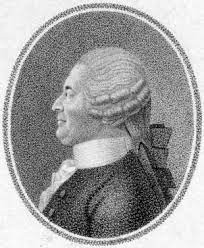In his prime, Georg Reutter was “the single most influential musician in Vienna,” according to British musicologist, David Wyn Jones. He was also noted to be one of the most prolific composers of his time.
Vital Statistics

Full name: Johann Adam Joseph Karl George Reutter
Born: April 6, 1708
Nationality: Austrian
Family facts: Georg Reutter the Younger received his early music training from his father, also a noted musician, and was the 11th child of 14 children.
Worked as: court organist of the Habsburgs, composer, Kapellmeister of St. Stephen’s Cathedral, Kapellmeister of the court of Habsburg.
Notable events during the composer’s lifetime: From 1740-1748, the War of the Austrian Succession tears through Europe. The nature of this great intercontinental conflict was dynastic, with Empress Maria Theresa (Reutter’s patroness)’s right to inheritance at its center. This war also marked the rise of Prussia as a major power in Europe.
What did he compose: Along with oratorios and operatic works, Reutter also wrote a vast amount of church music, including 80 masses, 6 requiems, 126 motets and over 200 minor works.
Biography
- Music training and court organist: early in his childhood, Reutter received training from his composer father, Georg Reutter the Elder, assisting him as court organist.
- 1727-1728: Composition of his first oratorio (1727) and his first opera, Archidamia, for the imperial court. Also, during this period, he applied for the position of court organist, but was rejected each time by Johann Joseph Fux, the then principal conductor of the Emperor Charles VI.
- 1729-1730, Italy: At his own expense, Reutter travelled to Italy around 1729. By February 1730, he was in Venice and in April of that same year, he was in Rome. During his time in Italy, Reutter received more second-hand training from Antonio Caldara in Neapolitan opera and church music. Reutter finally returned to Vienna in fall 1730.
- 1731, court composer: Reutter successfully applied for a post as court composer. This role was the formal step to a lifetime career and service within the Habsburg court.
- 1738, Kapellmeister of St. Stephen’s Cathedral: Reutter was 27th to occupy the post. As Kapellmeister, he supervised a staff of 31 musicians including:
- 5 choirboys, who sang the treble (soprano) part.
- 12 adult male singers: basses, tenors, and countertenors. The latter sang the alto part.
- 12 string players
- an organist
- a subcantor, who assisted Reutter.
- 1739-1749, Joseph and Michael Haydn’s supervisor and tutor: While visiting the town of Hainburg, Reutter oversaw the audition of 7-year-old Joseph Haydn. Reutter was impressed by the boy’s talent, and Haydn joined Reutter’s ensemble the following year. Haydn was later joined by his brother, Michael. Both boys served in Reutter’s choir until their adolescence and matured out of their soprano voices. Unfortunately, Reutter’s tutelage provided little to no fond memories or helpful mentorship for Haydn. He later recalls in his biography that Reutter’s choristers “were underfed”, and that he received only two lessons from Reutter in music theory and composition during his entire time as a chorister.
- 1751-1772, Court Kapellmeister: Reutter advances to the position and is later given sole management of the court orchestra by Empress Maria Theresa, a post he held until his death in 1772.
